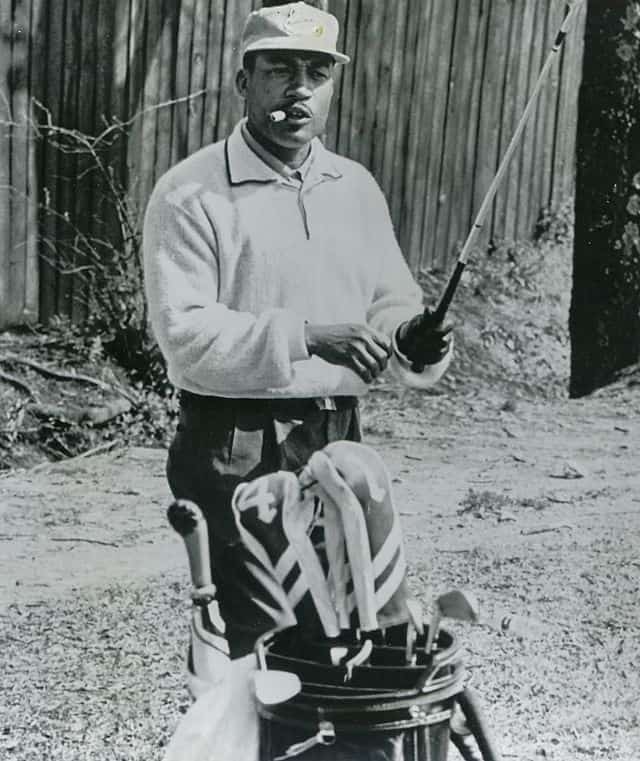Charlie Sifford broke the color barrier in golf. Until 1960, he couldn’t play on the Professional Golf Association (PGA) tour due to racial segregation. However, he didn’t give in to the rejection. His friendships with other players of color, like Jackie Robinson and Muhammad Ali, helped him push back.
In 1960, Sifford was allowed to compete in the PGA tour, opening the door for other black professionals. In this article, we trace his golfing journey.
Become an insider. Subscribe to our newsletter for more top trending stories like this!
Get a golf club on Amazon.
People Also Read: NFL Black Owners. A Close Look at the League’s Ownership
Charlie Sifford’s Early Life
Sifford was born in 1922 in North Carolina. By age 13, he was already involved in golf as a caddy. It was the only available role for black people. However, he was keen on playing the game.
When he turned 17, the golfer left North Carolina for Philadelphia and spent much of his time playing at the Cobbs Creek Golf Course, which was open to all, regardless of race.
People Also Read: Joseph Minala: How Age Cheating Claims Affected His Football Career
Professional Golf
In 1948, Sifford turned professional but was limited to tournaments organized by black golfers due to the PGA ‘caucasian only.’ As a result, Charlie Sifford’s attempt to join the PGA in 1952 was met with a lot of racial abuse. He and other black golfers found excrement on the first hole at the Phoenix Open.
He resorted to playing the National Negro Open which he won six times between 1952 and 1956. The following year, Sifford teed off at the Long Beach Open, which had some white players and was co-sponsored by the PGA.
Join our Spotcovery Global Black Community Facebook Group for early access to exclusive content and to share in a lively discussion.
Getting to the PGA
Sifford knew he needed help to break into the PGA. Jackie Robinson’s achievement in the Major League Baseball (MLB) inspired him. He moved to California, where he befriended Attorney General Stanley Mosk.
Mosk also faced discrimination due to his religious affiliation. Some golf courses didn’t allow Jewish members, except for the Hillcrest Country Club. When Mosk saw Sifford play, he was impressed and couldn’t let someone of his talent not have opportunities at the highest level.
Mosk used his influence as an Attorney General to help Charlie Sifford find his way into the PGA. His efforts bore fruit when in 1960, Sifford was allowed entry into the PGA tour and, in 1961, became a member. He was the first black person to gain entry into the association. The PGA also dropped its ‘caucasian only’ policy.
Buy golf shoes on Amazon.
People Also Read: Joseph Minala: How Age Cheating Claims Affected His Football Career
Become an insider. Subscribe to our newsletter for more top trending stories like this!
Playing in the PGA
Despite the change of law, many golfers and fans didn’t like having a black man on the tour. Charlie Sifford still experienced racial abuse, including death threats. Nonetheless, he persevered and showed how good he was.
In 1967, the pioneering golfer won the Greater Hartford Open, which is currently the Travelers Championship. He was the first black golfer to win a PGA tour tournament. Unlike other golf events, he received a lot of support.
In 1969, Sifford won his second event, the Los Angeles Open, now called the Genesis Invitational. He also won the Senior PGA Championship in 1975 and later the Suntree Classic.
Buy a golf ball on Amazon.
People Also Read: Simone Biles Triumphant Return to Gymnastics
Awards
For his contributions, Charlie Sifford was the first African American to join the World Golf Hall of Fame in 2004. Three years later, he received the Old Tom Morris Award.
In 2009, the Northern Trust Open created the Charlie Sifford Exemption, which is given to a player who represents diversity in the sport.
In 2014, Charlie Sifford was granted the Presidential Medal of Freedom.
Charlie Sifford’s memory lives on. His role in ushering the current black professionals in the sport was crucial. Tiger Woods acknowledged his presence and said he could have his career because of him.
Nearly 80% of consumers visit directories with reviews to find a local business. List your business for free in our exclusive Spotcovery Black-Owned Business Directory.
Spotcovery offers unique and fresh daily content on Black culture, lifestyle, and experiences. We talk about everything black, black people, black-owned and black-owned businesses. We also deliver authentic and relevant content that will inform, inspire, and empower you! The future of black media is critical to today’s black experience! Our primary audience includes African Americans, Africans, Afro-Caribbean, and people of African heritage. Black culture is for the culture!
Become an insider. Subscribe to our newsletter for more top trending stories like this!





